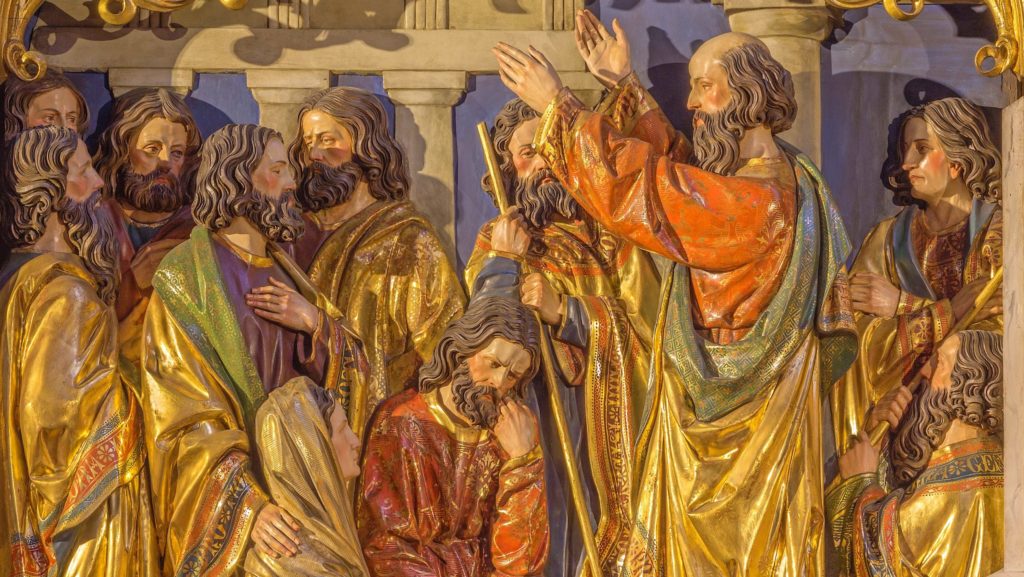It somehow seems appropriate that the inauguration of the next U.S. president is coinciding with the Church’s jubilee year, the theme of which is hope.
In the statement announcing the start of the jubilee year (officially on Dec. 24, 2024), Pope Francis described hope this way: “Hope dwells as the desire and expectation of good things to come, despite our not knowing what the future may bring.”
This lack of certainty, the pope went on, “may at times give rise to conflicting feelings, ranging from confident trust to apprehensiveness, from serenity to anxiety, from firm conviction to hesitation and doubt.”
All these feelings are abundantly present after the Nov. 5 election. For all those who voted for the winner, and for all those who opposed him, hope is what unites us both, even if for different reasons.
For Americans who feel financially strapped by the long recovery from the pandemic and the economic disruption it caused, hope is for financial relief.
For those who work on behalf of the unborn, there are a few victories to celebrate, as well as defeats to mourn.
For those among us — parents, spouses, children, and grandchildren — who are related to a person who is undocumented, or who themselves are not citizens, hope is that their lives will not be torn apart with the threat of deportation.
And for everyone who is living under the threat of extraordinary climate upheaval, or who has relatives or friends caught in war zones, there is the hope that next year will not be as bad as this one was.
Ordinary jubilee years take place every 25 years, a tradition in the Church that goes back to the year 1300. There are also extraordinary jubilee years, such as in 2015 when Pope Francis announced its theme as that of mercy, something the world also needs a lot more of.
A jubilee year becomes an opportunity for Catholics to reflect at length on its theme. It was that year that I really fell in love with the Gospel of Luke, which is the Gospel of Mercy. And it was the year when I noticed in a very powerful way how the prayers of the Mass are drenched with references to mercy.
Perhaps my favorite, which I had never paid much attention to before, is the Second Eucharistic Prayer, which we often hear at daily Mass. It has a line that rings with hope in God’s loving kindness:
“Remember also our brothers and sisters who have fallen asleep in the hope of the resurrection and all who have died in your mercy: welcome them into the light of your face.” [emphasis added]
God’s mercy is overflowing and generous. Ours, unfortunately, is not a merciful age, as evidenced by any amount of time spent on social media or watching campaign ads. It all stands in stark relief to Jesus’ discourse on loving our enemies: “Be merciful, just as your Father is merciful” (Luke 6:36).
If Luke’s is the Gospel of Mercy, perhaps St. Paul is the Apostle of Hope. “Hope does not disappoint,” Paul writes in the Letter to the Romans (5:5). For that half of the country whose candidate lost on Nov. 5, this might seem untrue. But Paul is a realist who also reminds us that “affliction produces endurance, and endurance, proven character, and proven character, hope” (Romans 5:3–4).
I’ve been hearing from people deeply disappointed by the election and worried about what will happen in the new year, not necessarily to themselves but to others. Whoever the losing candidate is in any election, there comes a time when disappointed supporters want to say “to heck with it,” and retreat. One friend wrote, “I will now become a survivalist and disengage from all politics.”
“Put not your trust in princes,” said the psalmist (146). Hanging all of our hope on any politician is probably a fool’s bet, but the lash of defeat stings, regardless.
Francis’ dream is that the jubilee year will allow us to discover “signs of hope” that are in fact all about us. “We need to recognize the immense goodness present in our world,” he wrote, “lest we be tempted to think ourselves overwhelmed by evil and violence.”
There are great needs, Francis reminds us. Our world needs to seek peace. It needs to care for our youth, for our families, and for families yet to be. It needs us.
Francis hopes this jubilee year will inspire us to action — to pardon prisoners, forgive debts (especially those of struggling nations), attend to the needs of the sick, the elderly, the disillusioned and, yes, to migrants.
Whoever we voted for, we should not invest too much time in self-pity or celebration. There is work to be done. The needs are great and the workers are always too few. Our hope remains in the Lord who we serve.

